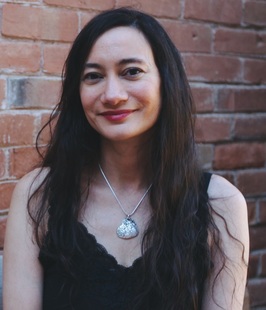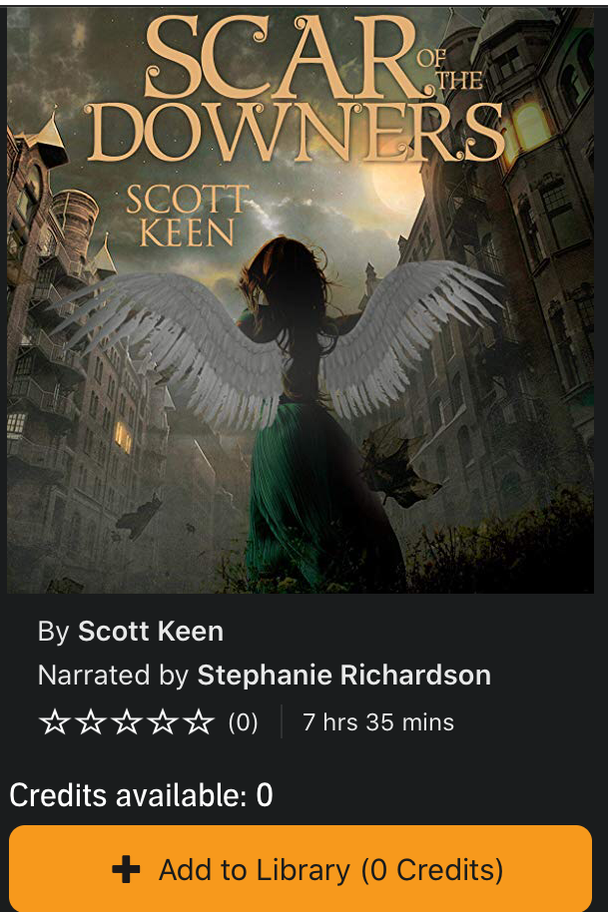 Today I have the pleasure of interviewing a very talented author. Elizabeth Naranjo is the author of The Fourth Wall and several short stories, articles and essays. The Fourth Wall is published by WiDo Publishing (the publisher for Scar of the Downers), and was one of the first books that my wife and I read when I signed with WiDo. We both enjoyed it! About the book: When Marin was little and monsters chased her through nightmares, she learned to weave her own dreams. Her mother called the lucid dreaming a gift, and when an accident takes her mother and leaves her baby brother an empty shell, Marin uses this gift to spin a new reality for herself. One without time or sorrow. A world without memory. But just when Marin thinks she is safe in her make-believe fantasy world, the monsters come back and her dream turns to a nightmare. Something in the dream doesn't want Marin to wake up. In order to heal herself and her family, Marin must face the truth she's forgotten and conquer what lies behind the fourth wall. When my wife read your book, she realized that she actually experienced lucid dreaming (which the main character, Marin, experiences) as a child. Both of us found this compelling to read about. Did you ever have any lucid dreaming experiences? Yes, I also experienced lucid dreaming as a child. I think children may be more prone to lucid dreaming because there’s less of a barrier between their subconscious and conscious mind, don’t you think? Anyway, I suffered nightmares when I was little, and I remember thinking, inside the dream, This is scary, I have to wake up. So I taught myself to do that; it was very simple. Little did I know then that the ability to know when you’re in a dream is unusual. Your book has a good bit of realism mixed in with fantasy. What was the biggest challenge you faced when you merged the two? It felt natural to me going between the two worlds. I can tell you that the biggest challenge with the dream world was its limitations, which were frustrating. I felt I wrote myself into a corner; it works, but the potential of a dream world is a dream itself for a writer, and for reasons you know because you’ve read the book, Marin’s dream world by its nature was unchangeable, at least by her. She didn’t have the control she assumed she did, so there was only so much I could have her do there in the first few scenes. When it began to fall apart, that was fun to write about. What is something you would like to say about the book that you haven’t already been asked? Wow, that’s a great question. I don’t think anyone’s asked which character was the toughest to write and which was the easiest. I had a hard time writing Frankie’s mom, because I didn’t like her much. And Tom was my easiest character to write, because I understood him best, and liked him best. On your blog, you mentioned that you wrote your second book back in April… Do you want to give anything away about it? Also, how are your revisions coming? Oh, sure! I’m excited to talk about this project. It’s a book of short stories—seven of them brand new and written in April--with the common theme of memory, or rather, the problems with memory. I am endlessly fascinated with this subject—how our reality is based on how we remember things, whether they happened five minutes ago, five years ago, or whether they really happened at all. The title of the collection, and of the first story, is called “What Was Never There.” It’s about a mother and a daughter who get lost in the woods, and how their fears—which are driven by memories of course—influence the choices that they make, particularly the mother. As you can probably guess, she makes some bad choices. There’s also a story about a woman who is unhappy with her life and therefore tries to rewrite it using a childhood diary; a man going through a divorce who witnesses a motorcycle accident while driving his daughter to school that will change his perception on many things; and a little boy who routinely steals away at night to meet a girl beneath a willow tree—both of them have secrets but only one of them knows the other’s. I’d say I’m about a month away from completing edits on the new stories and getting them out to beta readers. What drew you to be an author? Was it something you always wanted to do? Writing creatively is something I’ve always done. I remember my elementary school teachers praising my efforts at poetry and short stories, and their recognition and encouragement was huge for me. All of us want to feel like we’re good at one thing, like there’s something we were meant to do. I felt that way about writing—it became a big part of my identity. Growing up I would cling to that whenever I felt low—I’d think, “I’m not good at (fill in blank)” and then go, “Well, I can write though. That’s one thing I can do.” If you could drop everything and be a full-time author, would you do it? No. Not anymore. That was my dream years ago, when my youngest went off to preschool. I planned on writing anything I could to make a living off of it. But I realized three things. One, it’s nearly impossible to make a living as a writer. Two, trying to make a job out of it makes it feel like a job. Three, when you sit around all day writing you stop experiencing life, and you need to experience life to create more stories. Writing, for me, is typically a slow, laborious process anyway. I could never churn out words quickly enough to make a living, though I admire those who do. I think I’d have a better chance making money if I wrote nonfiction—articles and such. But that’s not my kind of writing; there are much better writers out there for that kind of writing. My strength is creative nonfiction and fiction, and there’s very little money in that. I’m okay with that now. What have been your biggest obstacles as an author? My biggest obstacles are marketing and researching. The first one prevents me from getting my work in front of others, and the second one prevents me from writing some of the stories I really want to write. A lot of authors bemoan this task of marketing, and no one probably wants to hear more whining about how introverted writers—frankly I’m sick of the “I” word myself—aren’t cut out for self-promotion. Let’s just ditch the “I” word here—I’ve learned that my issue goes beyond that. I flat out get paralyzed at the thought of self-promotion; the people I know in real life who don’t happen to follow me on social media probably don’t even know I’m a writer, let alone a writer who published a book. It’s sad; it’s a huge barrier that I want badly to overcome. The second problem, research, has to do with not knowing when to quit. I think a lot of writers do this, we get buried in researching our projects to the point we don’t actually start them. At some point you just have to jump in and start writing. Where did the idea of these characters come from in The Fourth Wall? Were they based on anyone in your life (if you can share)? I’ll keep a few of them secret. Carolyn strongly resembles a real-life counselor I knew in high school, though. Greg could have been a number of my male friends in school. Marin I saw clearly from the start, I just imagined this girl who was going through something terrible and didn’t want to face it; I wanted to help her but I also wanted her to learn something. She felt like a daughter to me. Tom represents no one I know, and neither does Frankie. Most of them are just made up completely, and I didn’t think much about them until they came into the story. Publishing can be a learning experience. Would there be anything you would change? Something you would do differently? Oh, I’d hire a publicist for sure. Also, I’d seek out book reviews early on. I waited too long to approach bloggers. What is your philosophy behind what makes a great story? Characters make the story great. I think if you focus on the characters, you can make any story compelling. Not to say I don’t love plot-driven work; I absolutely do. But I think story always starts with character, and I’d follow one I cared about on any journey—it can be a slow and meandering journey or an exciting, twisty one. Have you had any other works published? If so, can you tell us about them? I’ve been really fortunate to have several short stories and essays published. Links to them can be found here. I love the short form—flash fiction and very brief essays suit me. I love taking one scene, or one experience, and drawing it out over a few pages, focusing on a handful of details instead of a barrage of them. I’ve had longer pieces published too, one recently that I’m very proud of, about a young girl suffering from depression who has not yet learned to articulate her need for help. Unfortunately that is often the case for people of all ages suffering from depression or other mental illnesses. If they could just get beyond that gulf, just manage to say, one time, out loud, “I need help”—lives could be saved. Anyway, that’s my thing—quiet writing that focuses on people who usually have some deficiency in communicating, or who regularly balance on that thin line between what’s real and what’s imagined. Those are my people, and they do say to write what you know. Thank you, Elizabeth, for this opportunity to interview you! She wrote a great book and you can buy it here. Later this week, I'll post my review of The Fourth Wall. You can check out her website and blog as well.
12 Comments
Betty Heeter
10/14/2015 03:11:24 pm
I am Elizabeth's aunt and I can't tell you how proud her family is. I know that she had children and still makes the time for writing.
Reply
Scott Keen
10/14/2015 05:16:35 pm
She wrote a great book, and I'm grateful she was willing to participate in the interview! Thanks for visiting!
Reply
Oma Naranjo
10/14/2015 03:43:19 pm
Great interview!
Reply
Scott Keen
10/14/2015 05:17:59 pm
She's a great interviewee!
Reply
Letitia ruffolo-smith
10/14/2015 06:04:40 pm
I'm proud to say i work with Elizabeth. I believe her great nursing skills is what also makes her a great writer. I'm glad to hear she will never giveb up nursing by writing all the time although it is a loss because what a mind. Any one able to write that holds you intently to their book should be able to have what resources they need to continue that skill. I love reading. All you writers is what makes the rest of us escape and that gives us our chance to experience, learn, laugh, cry, imagine, have the hairs stand up on the back of our necks. Thank you so much. Never stop!
Reply
10/14/2015 08:01:31 pm
Great comment! Thanks for reading. It's why writers write.
Reply
Angel
10/16/2015 01:20:18 am
I've know Elizabeth for several years and remember her writing in Jr High and High School, I enjoyed the interview and look forward to reading the "What Was Never There."
Reply
S.G.
10/21/2015 09:54:36 pm
This interview had really good questions, my questions would be "So, uh,...whats it like being an author..?" :)
Reply
Leave a Reply. |
AudiobookArchives
February 2021
Categories
All
|
